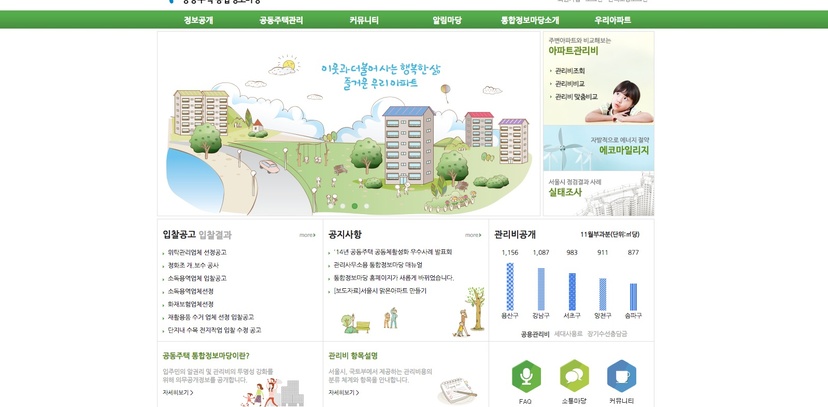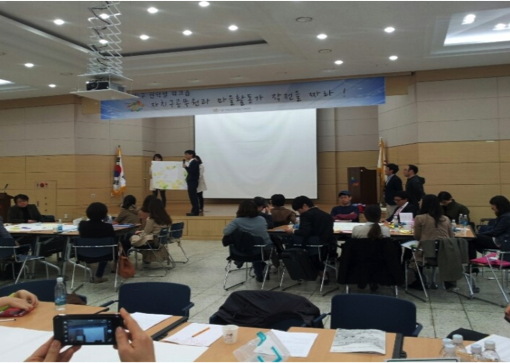
This year Social Life has been lucky enough to host SeonAe Kwon, who is on secondment in the UK from Seoul Metropolitan Government. Our collaboration with SeonAe has given the Social Life team some great opportunities to learn about Seoul City's work. This is the second in a series of blogs about what we have learnt from working with Seoul City. This blog, by SeonAe Kwon, explores Seoul City's Open Apartments platform for resident involvement.
In a world where cities are becoming more and more densely populated and the people living in cities become increasingly inundated with information, it is imperative that city governments utilize technology for social innovation. Seoul Government in South Korea is using useful IT platforms for effective solutions to various urban challenges. Creating successful high rise communities is one issue that Seoul Government is trying to tackle with open data, as living in apartments is increasingly affecting people's relationship with their neighbourhoods. Here I would like to introduce the example of an IT platform where Seoul Government is trying to revitalize the relationship between citizens and their high rise neighbourhoods.
With a population of 10 million, Seoul is the capital of South Korea. Eight out of 10 citizens are smartphone users and the IT access rate is very high because of the 96.6% of Internet penetration rate. Almost everyone can participate in Seoul policies through IT and citizens are becoming the centerpiece of decision making.
Apartments are a popular housing choice for the privacy they give and as a good choice for property investment. However, this more individualistic housing style has in some ways fractured the relationship with neighbours that was found in more traditional housing typologies, and some would argue that by living in towers, residents are losing the value and the benefits of community life. Sometimes, conflicts and distrust emerges between neighbours for example due to the noise and also with the administrative office when residents neglect of the communal areas.
The purpose of activating the communities in apartments is to recover the neighbourly relationships which have been lost since rapid economic growth and urbanization, reduce distrust and misunderstanding through sharing with the residents and discover consideration and the benefits in community. Apartment houses should be spaces which can enhance quality of life by activating exchange between residents of apartments and sharing resources and formation of a sense of community within apartment in the future. The case below shows how Seoul Government is making this happen.
Residents always wonder how the service charge they pay in their apartment blocks is managed. In response to this call for more information, the Seoul City Government developed an online platform called 'The Open Apartments' as an Integrated Information Platform of Apartments. As well as providing information about service charges, the portal aims to enhance the rights of the 6 million high-rise inhabitants by making all the data about apartment complexes open to citizens in 2013.
Seoul Metropolitan Government aims to put residents at the heart of decision-making processes by taking into consideration the interests of the community, enhance the transparency of the financing of the apartment's management, prevent disputes among inhabitants or with the management office, and activate diverse community groups by managing 'The Open Apartments' and creating Community Experts.
Every apartment complex within Seoul is registered on this portal, so citizens can compare fees of services like heating and water, the management or income by management and see the financial statements and other financial information.
The information about services, community information and bids for construction of remodeling or rebuilding of apartments is also available and it makes residents able to exchange information with each other and sustain good relationships as neighbours.
To use this platform, each apartment manager has to register basic information about the apartment complex and residents have to get approval from the apartment manager to register as a user of the portal. Then inhabitants of the apartments are able to search lots of information about management by joining the community, and they can find out about other apartments through the portal too. Anyone who wishes to share information or recruit people to their clubs or communities can upload their organization's information.
|
Contents of platform -the website of each apartment complex which offers basic information is registered -disclosure information of construction, services and operating - introduction of direct - sale market, events, and so on - introduction samples of other excellent communities like Eco-friendly, roof-top garden, co-parenting, shared training, culture, festivals, volunteer, Sports club operation, space utilization -providing public information material of renovation etc. including relevant laws |
There is however a recognition that this portal cannot work in isolation. In addition to the platform, the City Government is running an apartment residents school, community expert and online consultation system for giving answers to the complaints and suggestions of residents about apartment housing. Through these systems, Seoul Metropolitan Government aim to change culture of residential community positively and support them.
Workshop for making plans with public officers and village activists (12th April 2014)
The Community Experts System of 2-3 distinguished people at each borough has been running to support and help apartment communities. They are experts who provide opportunities for residents to be able to identify the status of each unit and to plan programs that fit their communities by themselves in order to support the creation of a happy community with good communication.
The diverse activities of the apartment community expert include the following:
- Diagnosis and evaluation : status of native groups, community activation, facilities, ages etc
- Identify demand of the inhabitants
- Activate action planning : a comprehensive plan including the basic direction on the ground of the results of the evaluation and diagnosis
- Investigate and develop activation project to customized community based on the action plan
- Enforce the business through liaison with native organizations and representatives
- Consultation about apartment community revitalization
- Encourage residents to join the business or communities by newsletters & announcement, events
- Encourage participatory culture within communities voluntarily by attracting activation
- Formation of good relationships between regional units with the support across-communication channels; promoting cooperative projects which more than 2 units can participate in.
- Identify the cause of friction between the neighbours in advance and mediation. conflict prevention
- Encourage residents volunteer participation with connection to the regional cooperation such as welfare facilities and provide the benefits of an external facilities.
Seoul's apartment community revitalization project is a vital opportunity to change the culture of apartment housing and a lever for apartment management transparency and restoring neighbourly relationships by participating in community life.
Earlier this year, Social Life hosted an event in collaboration with New London Architecture on living in tall buildings. City leaders, academics, planners and designers from cities across the globe were invited to explore what makes tall towers livable. Unlike cities in Asia, high density living has not been a feature of UK life, and perceptions have been tarnished by the memories of previous waves of high rise development that have been seen to fail, like many social housing estates of the 1960s and Canary Wharf in the 1990s. But now there are over 230 tall towers planned for London and the vast majority will be for residential use. So what can the UK learn from Seoul?
This post was written by SeonAe Kwon from Seoul Metropolitan Government.

